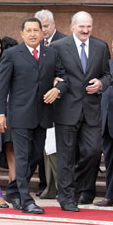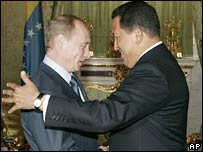Civil disobedience, the media, and you
...or...
The remarkable case of the AK-47 toting building inspectorYou couldn't have scripted a moment quite like it if you'd tried; it would've seemed too contrived, too caricaturesque by half.
The National Assembly was in the middle of an all-night debate on the government's unconscionable new Contents Bill (you know, the one that bans saying nasty things about the government) when Carlos Tablante, an opposition assembly member, takes the floor to give an impassioned speech against the bill. He closes by asking, rhetorically, "You keep talking about China and Cuba...in those countries there's only one leader, there's only one party, there's only one ideology, there's only one newspaper, there's only one radio station, there's only one TV station. Is that what you want here?" Well, he thought it was a rhetorical question...but the response from the chavista side of the aisle was a resounding chant of "¡Siiiiiii!"
Subtle, huh?
Sometimes, as you watch the aggressive antichavez bias on the TV here, you can almost understand the anger and frustration chavistas must feel. But any sympathy goes up in smoke at moments like that. Obviously, their problem is not with the newspapers and TV-stations we have, their problem is with the concept of a free and independent news media at all.
This afternoon witnessed a perfect demonstration of why a flawed private media is far preferable to no independent media at all. At about 6:00 pm, a municipal building inspector showed up at the offices of Súmate, the NGO that organized last weekend's massive signature-gathering drive. Their offices are located in Sucre Municipality, a section of Eastern Caracas run by a pro-Chávez mayor. Any notion that this was a normal building inspection was discarded when you had a look at her entourage: at least a dozen municipal cops, who were soon reinforced by a contingent of 20 or more assault-rifle toting, camouflage-wearing special operations cops, all decked out in bullet-proof vests and such. They claimed, incongruously, to be there just to make sure the building was up to code.
Now, say what you will, but I refuse to believe that Sucre municipal building inspectors routinely get that kind of escort when they go to check out buildings. It's a preposterous notion...which is not surprising, given that it's also the government's line. The Mayor of Sucre - who happens to be the vicepresident's son - claimed they had no idea those were Súmate's offices, that inspectors always go out with police escort. Ummm...that's just silly: if every municipal inspector needed 30+ cops every time they go out to do their rounds, there wouldn't be any cops left over to do anything else!
Súmate's folks were understandably alarmed by the visit - there were millions of signatures sitting in hundreds of thousands of forms at that site. It wasn't particularly hard to guess what the real target of the "inspection" was. Their first reaction was to hit the phones. Within minutes, every news station in town was carrying live news from the site. And within a few minutes of that, hundreds of people had poured out onto the streets around the site to face down the cops. Within an hour or so, the street in front of Súmate was a sea of people, an insta-march of at least 10,000 flag-waving, whistle-blowing protesters physically blocking access to the building.
That, dear reader, is civil disobedience in action.
The municipal cops wisely high-tailed it out of there empty handed. It was the only reasonable course of action - the crowd would've lynched them if they'd tried to walk away with any signatures.
So now you know why the government wants the private media shut down - and why even those of us who think they're doing an awful job have to defend them. With every state institutions under Chávez's control, people have no choice but to fight back against the government's autocratic excesses on their own, face-to-face, on the streets. And as we saw tonight, the media is the lynchpin of that strategy - people were able to mobilize en masse, within minutes, to defend their signatures only because they got the heads-up on TV and the radio. If we were living in the wondrous one-station state chavistas long for, the 4 million + signatures Súmate collected last weekend would probably be a smoldering pile of ashes by now.
Please comment responsibly:
|
Weil againHe's only 22, but he's already Venezuela's best editorial cartoonist.
Tal Cual's Weil is an evil genius.
Speech bubble: "Gentlemen: I think the situation in Venezuela is perfect...who agrees?"
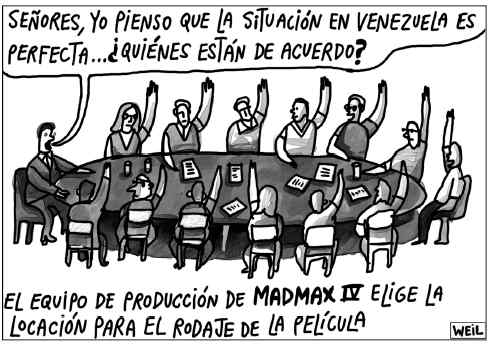
Caption: The production team for
Mad Max IV chooses the location for the shoot.
Please comment responsibly:
|
Toilet papersThe most insidious aspect of media bias in Venezuela is not how much the private broadcasters and newspapers attack the government. No, the real scandal is how much they suck up to the opposition. The constant Chávez-bashing is somewhat over the top, for sure, but it’s hard to condemn it too strenuously. The president goes so far out of his way to say and do crazy things all the time that whatever criticism he gets, he had it coming. The real bias, what’s really warping the national debate, is the sniveling, acritical support the papers give to an opposition leadership that doesn’t know it’s ass from its backside.
It’s not subtle. Back in December, when the opposition launched the general strike, every paper in town ran screaming six column headlines about it. Last week, when that
paro was called off, it was reported in a box on page 17.
It doesn’t take a genius to realize the
paro was a near-total fiasco – wrecking the oil industry, destroying thousands of jobs, bankrupting any number of companies and doing little, precious little to bring real pressure to bear on the government. In the end, the strategy amounted to mass-scale masochism, an action of the middle class that hurt no one so much as the middle class. Did it achieve anything? Well, I suppose now there's a group of "Friends of Venezuela" that sends its deputy foreign ministers for a nice stay at the Meliá once a month...that's an accomplishment. Was it worth the tens or hundreds of thousands of lost jobs and ruined lives it cost? Well, you be the judge.
By day 45, it was clear that the
paro was a failure, a calamity for tens of thousands of families, a political disaster that was only strengthening Chávez politically while chipping away at the opposition’s ability to resist his disastrous misgovernment. Yet, even then, the
paro dragged on for another 17 long days. Why?
Part of the reason, a worryingly large part of the reason, is that the people who designed and implemented the debacle never faced public scrutiny for it. The Venezuelan press operates under a self-imposed gag rule against criticizing them. Even when they screw up big time, they're beyond reproach. Criticizing them, the thinking seems to go, might give “the enemy” some sort of tactical advantage, and you certainly wouldn’t want to do that. So the papers won't print it. The newscasts won’t put it on the air. It’s banned, basically.
This is not a matter of conjecture, I’ve heard reporters at some of the country’s main papers describe the mechanism. Stories that are even mildly critical of key opposition leaders don’t make it past the editorial filter…they’re either cut or killed outright. Journalists who write too many of those soon find themselves getting less and less attractive assignments. Some have even been known to end up in the dreaded sports page. The message is straightforward.
The result is equally clear. The opposition's leadership always gets away with it, no matter how catastrophically irresponsibile, shortsighted, and just plain stupid their tactics are. They never face hostile questioning from reporters, never face critical scrutiny. In a sense, they’re locked in a little bubble just like the one the state media have created around Chávez. They never meet dissent face-to-face, it’s little wonder they’ve barely noticed how badly they're screwing things up.
You can’t say it in print, so I might as well say it here. The opposition’s umbrella group, the
Coordinadora Democrática, is a total mess – a forum for the pettiest of politicking, backstabing, meaningless squabbling, dirty tricks, end-runs against pluralistic decision-making mechanisms...a litany of the worst old-regime politics has to offer. The group is top-heavy with old style politicos who learned exactly nothing from the huge groundswell of disgust against them that first propelled Chávez to power. Cynical, self-serving machine politicians who simply don’t understand why the country once came to hate them, and still haven’t figured out that even people who hate Chávez are terrified at the prospect of putting them back in power.
The true democrats and idealists – and they’re in there too – often appear politically outgunned by the dinosaurs, and plainly don’t control the group. But more and more, disparate groups within the
Coordinadora make decisions on their own, without consulting anyone, and then pass them off as
Coordinadora decisions. In short, the
CoordinadoraDemocratica is not democratic, and it doesn’t coordinate anything.
But unless you read Teodoro Petkoff’s editorials in
Tal Cual or Ibsen Martínez’s columns in
El Nacional, you wouldn’t hear that from the Venezuelan press – that beacon of freedom and objectivity, that bulwark against autocracy. It’s pretty sick.
None of this makes Chávez's government any less awful. What's unacceptable is the way the opposition’s leaders have gotten into the habit of using Chávez’s awfulness as a shield to exempt themselves from any criticism. Go to a press conference and ask an opposition leader a hard question and he’s liable to frown at you and dismiss you saying, “damn it, who let this frikkin' chavista in here?” There’s just no space for any critical discourse on the opposition’s failings, which are many and serious.
It’s all very unfortunate, because the opposition’s supporters are, by and large, really cool: energetic, devoted, idealistic, and democratically minded. They deserve far better leadership than the parade of no-hopers they’re getting. They’ve marched their hearts out, again and again and again, sometimes at the risk of their lives. Literally. They’ve thumbed their noses at serious intimidation to go out and sign petitions against the government in chavista areas, they’ve banged their pots all out of shape, they’ve held prayer meetings, citizens’ assemblies, they’ve camped out, sang, danced on the streets, they’ve done everything they’ve been asked to do, willingly, with a smile and a sense of real, no-bullshit patriotism. Again and again their energy has bailed out their leaders, most recently last Sunday when they saved the
Coordinadora from the awful embarrassment of admitting the
paro had been a colossal fiasco by pouring out on the streets to sign en masse. They deserve better leaders than this, and they deserve much better newspapers they’re getting…newspapers willing to tell them, in plain language, that they have the right to demand better leaders than this.
Please comment responsibly:
|
The inimitable Weil Please comment responsibly:
Please comment responsibly:
|
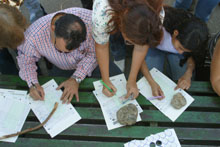 4,400,000 oligarchs...
4,400,000 oligarchs...It was a day to make saps out of all of us. The depression we'd felt after the Supreme Tribunal's inexcusable decision to scuttle the referendum that should've taken place today was wiped away entirely by what must have been the largest single-day signature gathering drive ever. (Somebody check Guiness.) The preliminary reports from the organizers, leaked to Venevisión, are that 4.4 million people went out to sign petitions today - that's about 700,000 more than voted for Chávez at his high-water mark. No Venezuelan politician has ever gotten this many votes in an election, even Carlos Andrés Pérez old record of 3.9 million votes in '88 was dwarfed by today's drive.
What's exciting is that the entire event was put together in very little time by a small army of volunteers, in the face of heavy intimidation from the government. In the event, the day was relatively peaceful, with only minor disturbances scattered across the country. Once again, despite government bluster, people weren't the slightest bit intimidated and went out to vote...um, sign...in force.
Boy did Chávez get it wrong if he thought he could avoid the embarrassment of getting drubbed in a consultative referendum by ordering his Supreme Tribunal cronies to kill it. In many ways, this is worse, much worse: we proved not just that an unprecedented majority of Venezuelans is against him, but also that we're mobilized enough to organize an act of mass-rejection on our own, without any state money, military oversight, logistics help, entirely by ourselves.
Chávez's oft-repeated lie that the opposition boils down to a small club of rich people has been a visible sham for a long time. But never had the depths of the lie's bankrupcy been exposed as thoroughly as today, when over four million of us thumbed our noses at the threats from his supporters to line up for hours to register our revulsion at his regime openly. Never had Chávez's hysterical denunciations of his opponents as fascists, terrorists and coupsters looked more pathetically out of touch with reality. Maybe I'm missing something, but I never did see Mussolini, clipboard in hand, out collecting signatures to ask for elections to institute a fascist state.
But then, what can you expect from Chávez at this point? Contradiction has become a kind of guiding principle for this guy, the cornerstone of his rhetoric. In today's
Aló, presidente he went from furiously condemning the opposition as a giant coup-plotting conspiracy to speaking fondly about the actual coup-attempt he staged 11 years ago, and announcing plans to celebrate the anniversary, which will be this Tuesday, February 4th. A-OK, then! So when people who disagree with you gather signatures, they're fascist coup-plotters, but when you personally lead an armed uprising against a democratically elected government, that makes you what? A freedom fighter, of course! Narcissism, anyone?
But then such criticisms have been levelled so often here, they barely register anymore. Chávez's discourse is so detatched from reality these days it's beside the point: what we're seeing is pure power-politics, a desperate attempt to hang on to power without any regards to principle or the general good. And the only way the government can win that game is by fighting tooth and nail to stop us from voting, not just now or in August, but ever again.
What's clear, is that the government's claim to represent the will of the downtrodden majority of Venezuelans has been dealt a fatal blow today. It's no longer a matter of polls or conjectures, it's now a mathematical certainty: most people in this country are willing to do whatever it takes, within the bounds of what's peaceful, to rid themselves of this crazed government. No regime can hold out against that kind of pressure for long.
Please comment responsibly:
|




 Chavez Reelection Blog: Katy documents the government's use of public resources for Chavez's partisan advantage.
Chavez Reelection Blog: Katy documents the government's use of public resources for Chavez's partisan advantage.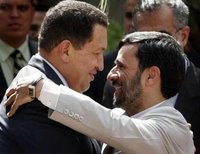

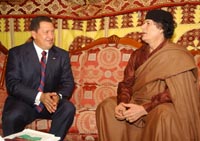
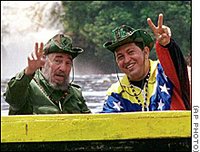
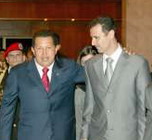
 Site feed
Site feed 